Assam's verdant landscapes are synonymous with rolling tea plantations, a source of livelihood for millions. Yet, a bitter truth taints this idyllic scene - the exploitation of children through forced labour. Bal Raksha Bharat, the Indian arm of Save the Children, a non-profit organization dedicated to improving the lives of vulnerable children across India, is on a mission to eradicate this practice and ensure a brighter future for Assam's children.
To understand the depth of this issue and explore how Bal Raksha Bharat is making a difference, let’s delve into the following case study:
Registered on April 7, 2008, as an independent entity, Bal Raksha Bharat has been at the forefront of numerous initiatives aimed at ensuring children's rights to education, protection, health, and overall well-being. One of their significant projects launched in 2021 focuses on combating child labour in the tea plantations of Assam.
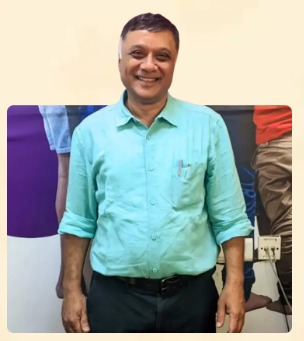 This project takes a collaborative approach. Sudarshan Suchi, CEO, Bal Raksha Bharat, emphasizes, "Our efforts to address child labour in Assam's tea plantations involve strategic engagement with various stakeholders, including government bodies, industry associations, and local communities. This collaborative approach is crucial to achieving sustainable change." Our strategic approach revolves around collaborating with governmental systems, extending support to various Ministries, and engaging closely with esteemed institutions such as NITI Aayog, National Institute of Disaster Management, and National Skill Development Corporation. Our efforts are dedicated to furthering the government's vision of a Viksit Bharat, with a primary emphasis on providing children and youth—the future architects of our nation—with a promising start in life. Our goal is to facilitate positive change for children, aligning with the overarching objective of "Sabka Saath, Sabka Vikas, Sabka Vishwas, and Sabka Prayas"—the Vision India@2047.
This project takes a collaborative approach. Sudarshan Suchi, CEO, Bal Raksha Bharat, emphasizes, "Our efforts to address child labour in Assam's tea plantations involve strategic engagement with various stakeholders, including government bodies, industry associations, and local communities. This collaborative approach is crucial to achieving sustainable change." Our strategic approach revolves around collaborating with governmental systems, extending support to various Ministries, and engaging closely with esteemed institutions such as NITI Aayog, National Institute of Disaster Management, and National Skill Development Corporation. Our efforts are dedicated to furthering the government's vision of a Viksit Bharat, with a primary emphasis on providing children and youth—the future architects of our nation—with a promising start in life. Our goal is to facilitate positive change for children, aligning with the overarching objective of "Sabka Saath, Sabka Vikas, Sabka Vishwas, and Sabka Prayas"—the Vision India@2047.
Through innovative models, they aim to create programs that the government can adopt and expand. Since 2021, their on-ground work has directly benefitted over 3.5 million children. Thematic programs have reached an additional 2.9 million, and humanitarian responses have supported another 5 lakh children. This impact reflects the success of 234 projects supported by 160 donors, demonstrating their commitment to positive change for children across India.
While the achievements are significant, understanding the broader context is crucial to fully appreciate the impact of these efforts. Let’s dive into the issue at hand.
Addressing the Root Causes
Prevalence of child labour in Assam’s tea industry, affecting 20% of the population.
About 20% of Assam’s population (6.5 million) is directly associated with about 800 large tea plantations. Traditionally, tea is grown in large plantations managed by companies governed by the Plantation Labour Act, 1951 in India. However, over the last four decades, there is a steady growth in numbers of small holding tea cultivators called as small tea growers (STG). According to the All Assam Small Growers’ Association there are more than 1,44,222 number of small tea growers in the state cultivating in about 80,948 ha of land and over the past 3 decades their contribution have reached to around 50 % of the total volume of tea being produced in Assam.
Negative impacts on children’s education, health, and overall development
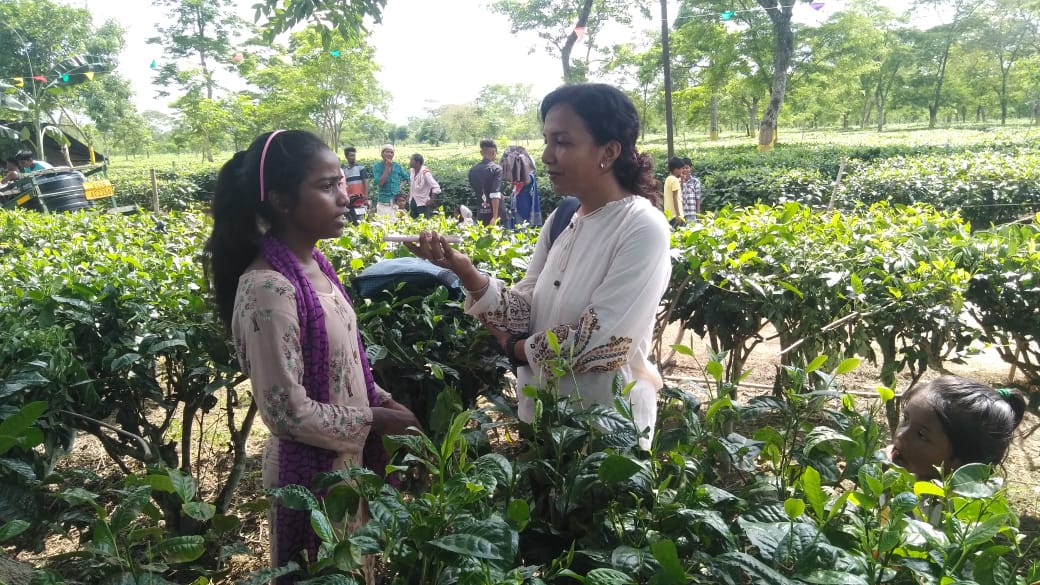 Children are the worst affected in this situation as they are not only forced to work and contribute to the family income but are also subject to dropping-out from schools due to poor educational infrastructure, trafficking, early marriage, domestic violence, abuse and exploitations. Similarly, several challenges exist with the functioning of large tea plantations. Large plantations suffer from labour shortage primarily due to marginal workers opting for government sponsored employment guarantee scheme (MGNREGA) even as they are provided with housing, medical and other amenities by large plantation owners. Plantation owners then reach out for alternate coping mechanisms such as child labour or exploiting existing labourers.
Children are the worst affected in this situation as they are not only forced to work and contribute to the family income but are also subject to dropping-out from schools due to poor educational infrastructure, trafficking, early marriage, domestic violence, abuse and exploitations. Similarly, several challenges exist with the functioning of large tea plantations. Large plantations suffer from labour shortage primarily due to marginal workers opting for government sponsored employment guarantee scheme (MGNREGA) even as they are provided with housing, medical and other amenities by large plantation owners. Plantation owners then reach out for alternate coping mechanisms such as child labour or exploiting existing labourers.
Broader socio-economic challenges faced by tea plantation communities.
1. The state of Assam in India is home to 31 million people, a third of whom are poor. The incidence of poverty in Assam remains higher than the national average, with poverty levels being very high in some parts of the state. Growth, which is driven mainly by services, is among the lowest in the country
2. About 20% of Assam’s population (6.5 million) is directly associated with about 800 large tea plantations
3. While the region is renowned for producing more than 50% of Indian tea, it’s a paradox that the people in tea production, from plucking, to withering, to final packaging, are particularly alienated from the mainstream of development and record low progress on human development indicators particularly in the areas of the level of education, health and sanitation, housing condition, nutrition, per capita income etc. of the communities are significantly poor.
Traditionally, tea is grown in large plantations managed by companies governed by the Plantation Labour Act, 1951 in India. However, over the last four decades, there is a steady growth in numbers of small holding tea cultivators called as small tea growers (STG). According to the All Assam Small Growers’ Association there are more than 1,44,222 number of small tea growers in the state cultivating in about 80,948 ha of land andover the past 3 decades their contribution have reached to around 50 % of the total volume of tea being produced in Assam. One of the reasons for this transition can be attributed to the fact that their numbers boomed exponentially with very little regulation by the Government. Started as an experiment in 1980s as a medium of alternative livelihood, riding on the wave of demand created for fine quality tea by the organized sector, the STGs sector grew rapidly by producing inferior quality tea for the open market. Hence, in order to increase their profit margin, they compromise on quality, engage in harmful agricultural practices and often circumvent the benefits to be provided to the plantation workers and compromise with the ethical practices and sustainability standards. In most cases, the small tea growers are economically challenged families, who lack the required skills, capital and technical support to make the business viable.
Years of planned exclusion coupled with lack of awareness to social security schemes have confined a large section of the tea plantation workers under intergenerational poverty. The recurring floods in the region further aggravates the condition by pushing them in the vicious cycle.This systemic disadvantage extends particularly to women, who constitute 50% of the workforce in tea plantations and are engaged in labour-intensive tasks like plucking tea leaves and pruning. Despite their significant role, women face marginalization in their workplaces, families, and communities. This marginalization is further compounded for adolescent girls, affecting their overall growth and well-being. Addressing these intertwined issues is crucial for creating a more equitable and supportive environment for all individuals involved.
In light of these challenges faced by women and girls, it is crucial to examine how child labour exacerbates the situation.
Detailed Analysis of Child Labour Issues in Assam’s Tea Plantations:
Children, both boys and girls, are the worst affected in this situation as they are not only forced to work and contribute to the family income but are also subject to dropping-out from schools due to poor educational infrastructure, poor nutritional status, at increased risk, particularly girls to trafficking, child marriage, domestic violence, abuse and exploitations.
- Impact on children’s education, health, and development:
A study conducted by Tata Institute of Social Sciences in 2019 has observed that there was a high incidence of child labour in the small tea gardens. According to Census 2011, more than 300, 000 children (5-14 years) in Assam were engaged in labour. As per Assam State Commission for Protection of Child Rights, out of 4 percent working children in Assam, about half (1.58%) work in tea estates. While some of the children were school going, there were many others who didn’t go to school ever. It was also noted that children in tea gardens mostly studied up-to primary school. This was primarily because those schools were located nearby. However, stepping into the next level of education became difficult, as high schools are located mostly in the towns. It became even more difficult for girls to pursue education after primary school. As a result, the dropout rate for girls in tea gardens is quite high. Similarly, the Rapid Needs Assessment carried out by Save the Children with the tea plantations workers in Assam during COVID-19 has revealed that ‘limited cash for day-to-day expenses’ (67%), ‘lack of livelihood / job opportunities’ (28%) and ‘lack of sufficient food supplies’ (28%) were the three primary challenges faced by the respondents. About 6 percent of the households resorted to either loan mortgage, sell household assets, or reduce frequency of meals.
- Socio-economic challenges in tea plantation communities:
Children of tea plantation workers, particularly the small tea growers, face severe protection issues owing to chronic household poverty, lack of awareness among the stakeholders in tea supply chain and ineffective child protection mechanism. In addition, girls face gender-based discrimination and inequalities, entrenched in deep patriarchy, harmful gender and social norms.
Strategic Interventions and Innovative Solutions: A Comprehensive Approach to Combating Child Labour
Jointly with the government and other stakeholders of the tea industry, Bal Raksha Bharat, with its intervention strategies is working to empower the children and communities in tea plantations of Assam. Over the past four years, the organization has directly reached 25,000 children and adults across 50 large tea plantations and 2,000 small tea growers in both Jorhat and Dibrugarh districts. Some of the strategic engagements are as follows:
1. Engagement with Government to strengthen the Child Protection Mechanisms in the intervening districts and the state.
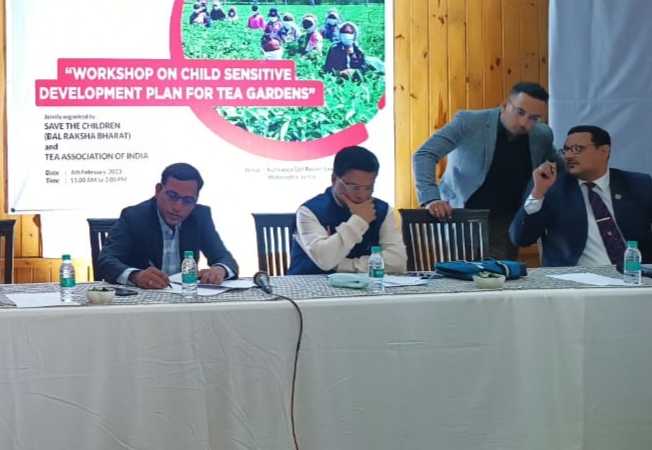 2. Bal Raksha Bharat, in collaboration with the Tea Association of India (TAI), organized a first-of-its-kind workshop on the Child Sensitive Development Plan for children residing in the tea garden areas. Tea Estate Managers, Welfare Officers, and Assam Chah Mazdoor Sanghs from as many as 40 tea estates under TAI’s Jorhat chapter convened to deliberate on the Child Sensitive Development Plan (CSDP). The CSDP is designed to benefit the overall development of children while contributing to responsible business practices and societal causes. Through ongoing engagement with TAI, a Child Sensitive Development Plan was developed for 14 tea gardens under TAI-Jorhat Circle in November. Bal Raksha Bharat and TAI, in collaboration with WCD, SLSA, and ALC, are working on the plan’s preparation and execution. TAI issued a circular on December 10, 2023, to all concerned tea gardens under the Jorhat circle to implement the CSDP in a timely manner. Additionally, on December 28, 2023, in Dibrugarh, CSDP was developed for another 10 tea gardens. Continuous awareness sessions for the holistic development of children are ongoing.
2. Bal Raksha Bharat, in collaboration with the Tea Association of India (TAI), organized a first-of-its-kind workshop on the Child Sensitive Development Plan for children residing in the tea garden areas. Tea Estate Managers, Welfare Officers, and Assam Chah Mazdoor Sanghs from as many as 40 tea estates under TAI’s Jorhat chapter convened to deliberate on the Child Sensitive Development Plan (CSDP). The CSDP is designed to benefit the overall development of children while contributing to responsible business practices and societal causes. Through ongoing engagement with TAI, a Child Sensitive Development Plan was developed for 14 tea gardens under TAI-Jorhat Circle in November. Bal Raksha Bharat and TAI, in collaboration with WCD, SLSA, and ALC, are working on the plan’s preparation and execution. TAI issued a circular on December 10, 2023, to all concerned tea gardens under the Jorhat circle to implement the CSDP in a timely manner. Additionally, on December 28, 2023, in Dibrugarh, CSDP was developed for another 10 tea gardens. Continuous awareness sessions for the holistic development of children are ongoing.
3. Formation of five Farmer Producer Companies (FPCs) for small tea growers to encourage the collectivization of this unorganized sector. Regular training and capacity-building programs are being conducted at tea garden locations and district levels to ensure their smooth functioning and sustainability. Technical support has been received from Agricultural University, Jorhat, Tea Research Association, Jorhat, and financial institutions.
4. Tactical collaboration with unions and associations of the tea industry to address Child Rights and Business Principles. Through continuous interactions and engagements with key stakeholders and target groups, Assam Chah Mazdoor Sangha (ACMS) has incorporated the Child Rights Agenda into their five-year strategic plan. ACMS is actively involved in strengthening community-based child protection mechanisms in tea plantations and forming women’s groups to address issues related to the holistic development of children and women.
5. Support for the All Assam Small Tea Growers Association (AASTGA) in developing and adopting the Code of Conduct for small tea growers.
6. Establishment of 10 Child Friendly Corners in 10 police stations in the intervening districts, followed by training of frontline police officers on child-friendly policing.
7. Recognition of Child Champions representing national, state, and international platforms. These champions received accolades from various government departments, including the National Institution for Transforming India (NITI) Aayog. Child Champions Smt. Radha Kurmi and SoritaSobro were honoured by the District Administration of Dibrugarh for their exemplary contributions to society on International Women's Day, March 8, 2024.
Fundamental Approaches Adopted:
1. Communities and Adolescent groups are empowered through capacity building on rights & entitlements as well as improvement in Household economy though enhanced soft-skills, linkage with social security; activities like
a) Support to the Child Protection Committees;
b) Capacity Building of adolescent groups;
c) Children led advocacy;
d) IEC for campaign on girls’ safety
e) linkages with social security schemes
2. Child Rights and Business Principles are understood and practiced in supply chain of tea industry (Engagement with Stakeholder relating to Tea Industry); Activities like-
a) Engagement with Small Tea Growers (STG) Farmer Producer Group (FPCs);
b) Workshop/Consultation/Sensitisation programme with unions & associations of Tea Industry
3. Government child protection workforce is more capacitated and coordinated to address the child protection issues in the state and Media is positively engaged in highlighting the issues of Children; Activities-
a) Technical support to government both the district & State Level;
b) Engagement with Law Enforcement/ Legal Services;
c) Coordination meeting with Govt. and NGOs at district and state level;
d) Strategic engagement with Govt. Dept/ Institutions/ CSOs
- Multi-stakeholder approach involving government bodies, police, unions, educational institutions, and industry associations:
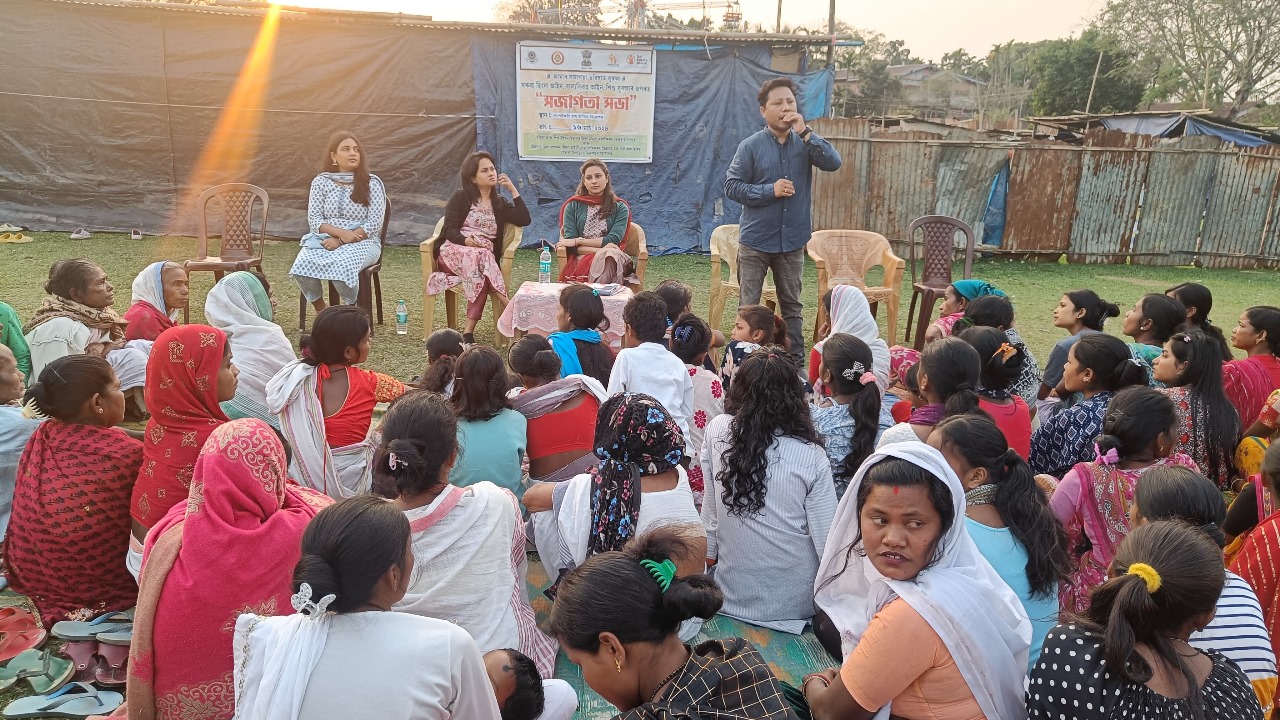 The interventions in large tea plantations in Assam began in 2014 with support from Save the Children Italy to 'create a protective and enabling environment for the children in tea gardens' (G0235). These efforts have achieved several milestones, including the birth registration of children, improved quality education at the primary level, enhanced sanitation practices, skill training for young adults, and the establishment of community-based child protection mechanisms. Bal Raksha Bharat has conducted numerous studies and advocacy briefs, strategically engaging with various stakeholders, including government and media, to raise awareness about the issues.
The interventions in large tea plantations in Assam began in 2014 with support from Save the Children Italy to 'create a protective and enabling environment for the children in tea gardens' (G0235). These efforts have achieved several milestones, including the birth registration of children, improved quality education at the primary level, enhanced sanitation practices, skill training for young adults, and the establishment of community-based child protection mechanisms. Bal Raksha Bharat has conducted numerous studies and advocacy briefs, strategically engaging with various stakeholders, including government and media, to raise awareness about the issues.
The grassroots child protection mechanisms have been functioning effectively, as evidenced by the increased reporting of child rights violation cases, re-enrolment of out-of-school children, and a reduction in incidents of child marriage. Highlights of the project include:
1. Empowering Child Champions from tea gardens as child rights advocates and facilitating their participation in interfaces for convergent and collective actions.
2. Bal Raksha Bharat playing a key role as a member of the drafting committee for the State Rules of the Juvenile Justice Act (Care and Protection) 2015 in Assam, led by the respective state governments.
3. Efforts leading the Sonitpur District Administration to issue an order to the Assam Branch of the Indian Tea Association to ensure 100% birth registration for all children in the tea gardens.
4. Bal Raksha Bharat, in collaboration with the Assam State Commission for Protection of Child Rights, organizing several consultations on the Plantations Labour Act 1951, with recommendations submitted to the Ministry of Labour and Employment, Government of India by the Government of Assam.
5. Providing technical support to the State Child Protection Society in Assam and preparing guidelines for the functioning of Child Protection Committees, which have been notified by the respective state governments.
6. Supporting SCPS in drafting guidelines for District Needs Assessment and District Child Protection Plans in Assam.
In this context, Sudarshan Suchi states,“We strengthened our engagement with government duty-bearers through capacity building and promoted multi-stakeholder engagement to create lasting change and impact in the lives of children. We collaborated with the State Government to support the implementation of the Integrated Child Protection Scheme and facilitate technical, financial, and legal support to plantation workers. The key Government bodies include Assam State Commission for Protection of Child Rights, State Child Protection Society - Assam, Assam Police, Assam State Rural Livelihood Mission, Assam State Legal Services Authority, Directorate for Welfare of Tea and Ex-Tea Garden Tribes, and the Tea Board of India.”
Strategic Partnerships and Results:
Their engagement with business partners has helped promote sustainable business models for small tea growers and facilitated the adoption of child rights and business principles within the tea supply chain. The collaboration extends to Tea Corporates & companies, the Tea Association of India, IDH – the Sustainable Trade Initiative, Rainforest Alliance, Trustee, Assam Chambers of Commerce, and the National Bank for Agriculture & Rural Development.
In addition, they have worked with key civil society organizations and networks such as the United Nations Global Compact, UNICEF – Assam Office, Joining Forces (a network of child rights organizations working to end the exploitation and abuse of children in India), All Assam Small Tea Growers Association (AASTGA), Confederation of Indian Small Tea Growers Association (CISTA), and Assam Cha Mazdur Sangh (Tea Plantation Workers’ Union) to build momentum and achieve results at scale.
Their academic collaborations with Tea Research Association, Assam Agriculture University - Jorhat, Centre for Tea and Agro Studies in Dibrugarh University, and Tata Institute of Social Sciences – Guwahati are aimed at generating evidence and providing technical support to Farmer Producer Organisations.
Results at Scale:
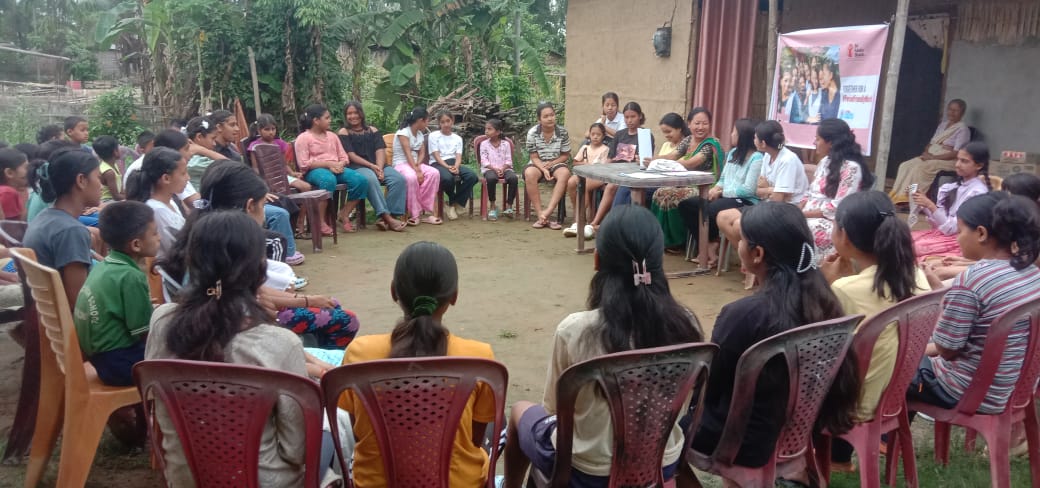 Apart from directly reaching out to approximately 30,000 people, including 10,000 children (at least 50% girls) and 5,000 plantation workers, the project is expected to indirectly impact many more through collaborations with associations and networks. Improved practices within government child protection mechanisms are anticipated to have far-reaching implications beyond the project locations and duration. Additionally, the intended changes in the policies and practices of the tea supply chain towards child rights and business principles will contribute to creating a safer environment for children.
Apart from directly reaching out to approximately 30,000 people, including 10,000 children (at least 50% girls) and 5,000 plantation workers, the project is expected to indirectly impact many more through collaborations with associations and networks. Improved practices within government child protection mechanisms are anticipated to have far-reaching implications beyond the project locations and duration. Additionally, the intended changes in the policies and practices of the tea supply chain towards child rights and business principles will contribute to creating a safer environment for children.
Year of Initiation and Major Milestones:
- Launched on February 1, 2021, the project has made significant progress through the involvement of key stakeholders such as Gram Panchayats, Tea Garden Management, industry associations, government bodies, and NGOs.
- Memorandums of Understanding (MoUs)
Details of MoUs with All Assam Small Tea Growers Association and Dibrugarh University are as follows:
- A Memorandum of Understanding (MoU) was signed between All Assam Small Tea Growers Association and Save the Children on May 6, 2022. This agreement focuses on jointly addressing human rights issues, with Save the Children supporting the association in strengthening their business through the collectivization of Small Tea Growers (STGs) and enhancing market linkages for their products.
- A Memorandum of Understanding (MoU) was signed with Dibrugarh University for a collaborative approach to holistic community development, focusing on children’s and women’s issues. The joint initiatives include knowledge sharing, the initiation of academic programs and curricula related to child rights, capacity-building training for students and relevant stakeholders, community-based action research, and documentation of best practices.
- An MoU with Assam Women University, Jorhat was signed on July 27, 2022. This agreement aims to address various social issues through collaboration, with a focus on creating women entrepreneurs. The plan includes developing women entrepreneurs in the tea industry, particularly Small Tea Growers (STGs).
Impact Overview and Welfare Measures:
In the period of 2021-22, a total of 73 workshops were conducted, benefiting 5,775 individuals. As of September 2022, an additional 13 workshops have been organized under the Social Action Plan, reaching 847 beneficiaries in the North East Region.
Furthermore, the Tea Board has launched the Tea Development and Promotion Scheme, 15th Finance Commission for the period 2021-26. This scheme provides financial assistance aimed at enhancing tea production, productivity, exports, value addition, and welfare measures for small tea growers and their dependents. Notably, this initiative includes welfare measures for Small Tea Growers, a first in the sector. The Tea Board has allocated Rs 7.2 crores specifically for these welfare measures.
The Assam Tea Gardens project by Bal Raksha Bharat has achieved numerous milestones in improving child welfare and protection in the tea garden communities.
- Direct Impact on Children and Adults: Since 2021, the initiative has directly reached 25,000 children and adults across 50 large tea plantations and 2,000 small tea growers in the Jorhat and Dibrugarh districts. This engagement has resulted in improved educational attendance, reduced child labour, and increased awareness of child rights.
- Strengthening Child Protection Mechanisms: Through strategic partnerships with government bodies, the project has strengthened child protection mechanisms. This includes the development and implementation of the Child Sensitive Development Plan (CSDP) across multiple tea gardens, ensuring a protective environment for children.
- Empowering Communities: The project has empowered local communities and adolescents by building their capacity on rights and entitlements, improving household economies through enhanced soft skills, and linking them with social security schemes. This empowerment has been pivotal in addressing issues such as child labour, early marriage, and domestic violence.
- Collaboration with Stakeholders: The initiative has fostered collaboration with various stakeholders, including the Tea Association of India, Assam Chah Mazdoor Sangh, and All Assam Small Tea Growers Association. These partnerships have been crucial in promoting sustainable business practices and incorporating child rights and business principles within the tea supply chain.
- Capacity Building and Training: The project has focused on capacity building and training programs for government child protection workforce, police officers, and community members. This has led to increased reporting of child rights violations and better coordination in addressing child protection issues.
- Recognition and Advocacy: The project's efforts have been recognized at national and state levels, with child champions from the tea gardens receiving accolades for their contributions. Additionally, Bal Raksha Bharat has played a key role in drafting state guidelines for child protection and advocating for improved policies and practices.
- Improving Livelihoods: The formation of Farmer Producer Companies (FPCs) for small tea growers has encouraged collectivization and provided technical support, thereby improving the livelihoods of economically challenged families involved in tea cultivation.
- Holistic Development Initiatives: The project has set up Child Friendly Corners in police stations, supported the creation of women’s groups, and facilitated continuous awareness sessions for holistic child development.
The significance of these achievements lies in the creation of a safer, more nurturing environment for children in Assam's tea gardens. By addressing the root causes of child labour and other vulnerabilities, the project not only improves the immediate conditions for children but also lays the foundation for sustainable, long-term change in these communities.As we reflect on these impactful interventions and the ongoing challenges, it is clear that the journey toward ending child labour in Assam’s tea plantations is a collective endeavour. The road ahead demands not only continued commitment but also a unified approach from all sectors involved.
CEO's Call to Action
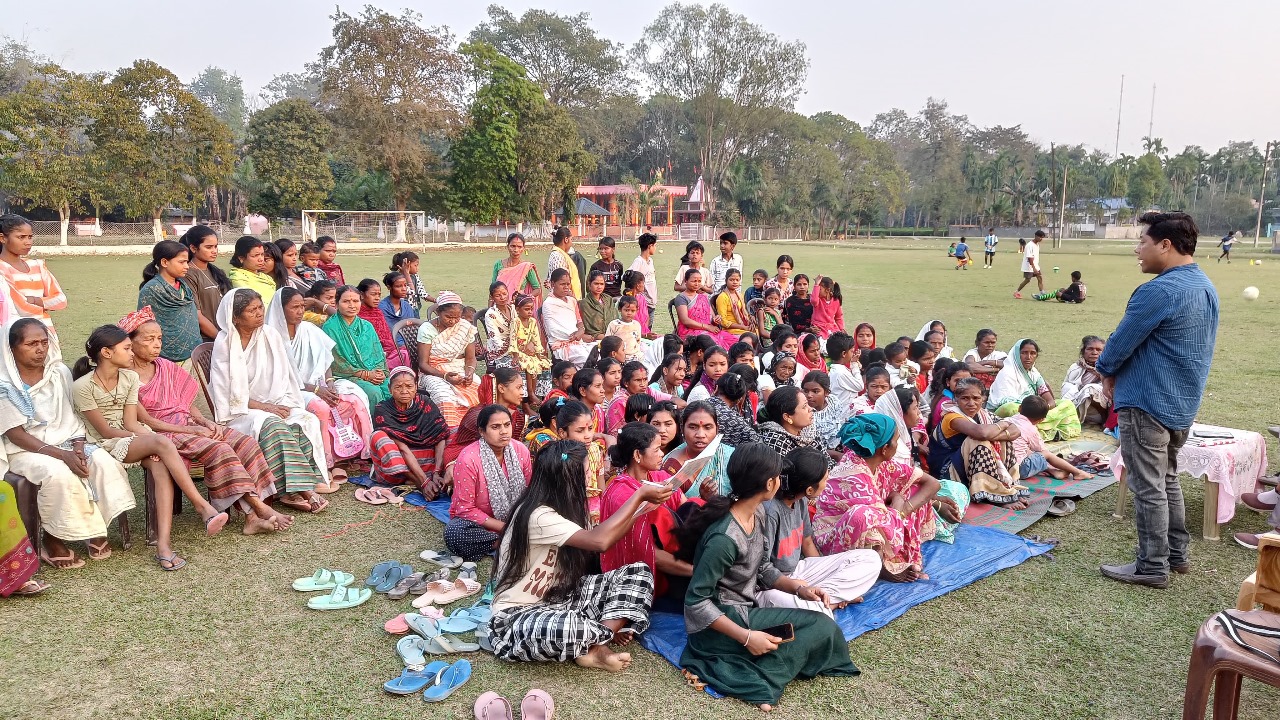 Sudarshan Suchi emphasizes, “The success of Bal Raksha Bharat's Assam Tea Gardens project highlights the transformative impact of collaborative efforts in combating child labour and promoting child rights. However, our mission is far from complete. I urge all stakeholders—government bodies, industry leaders, civil society organizations, and the community at large—to continue their invaluable support and collaboration.
Sudarshan Suchi emphasizes, “The success of Bal Raksha Bharat's Assam Tea Gardens project highlights the transformative impact of collaborative efforts in combating child labour and promoting child rights. However, our mission is far from complete. I urge all stakeholders—government bodies, industry leaders, civil society organizations, and the community at large—to continue their invaluable support and collaboration.
By uniting our efforts and resources, we can build on our successes and move closer to a future where every child in Assam's tea gardens enjoys their right to education, protection, and a childhood free from labour. Join us in this critical journey to safeguard and uplift the lives of children, ensuring their bright futures.”




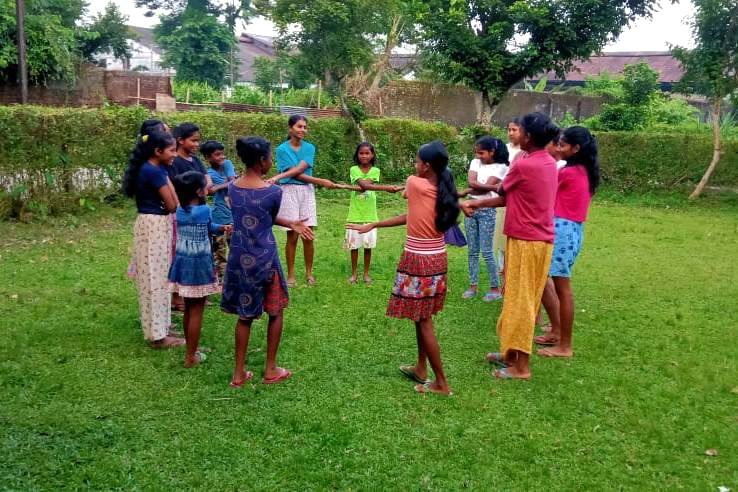
 This project takes a collaborative approach. Sudarshan Suchi, CEO, Bal Raksha Bharat, emphasizes, "Our efforts to address child labour in Assam's tea plantations involve strategic engagement with various stakeholders, including government bodies, industry associations, and local communities. This collaborative approach is crucial to achieving sustainable change." Our strategic approach revolves around collaborating with governmental systems, extending support to various Ministries, and engaging closely with esteemed institutions such as NITI Aayog, National Institute of Disaster Management, and National Skill Development Corporation. Our efforts are dedicated to furthering the government's vision of a Viksit Bharat, with a primary emphasis on providing children and youth—the future architects of our nation—with a promising start in life. Our goal is to facilitate positive change for children, aligning with the overarching objective of "Sabka Saath, Sabka Vikas, Sabka Vishwas, and Sabka Prayas"—the Vision India@2047.
This project takes a collaborative approach. Sudarshan Suchi, CEO, Bal Raksha Bharat, emphasizes, "Our efforts to address child labour in Assam's tea plantations involve strategic engagement with various stakeholders, including government bodies, industry associations, and local communities. This collaborative approach is crucial to achieving sustainable change." Our strategic approach revolves around collaborating with governmental systems, extending support to various Ministries, and engaging closely with esteemed institutions such as NITI Aayog, National Institute of Disaster Management, and National Skill Development Corporation. Our efforts are dedicated to furthering the government's vision of a Viksit Bharat, with a primary emphasis on providing children and youth—the future architects of our nation—with a promising start in life. Our goal is to facilitate positive change for children, aligning with the overarching objective of "Sabka Saath, Sabka Vikas, Sabka Vishwas, and Sabka Prayas"—the Vision India@2047. Children are the worst affected in this situation as they are not only forced to work and contribute to the family income but are also subject to dropping-out from schools due to poor educational infrastructure, trafficking, early marriage, domestic violence, abuse and exploitations. Similarly, several challenges exist with the functioning of large tea plantations. Large plantations suffer from labour shortage primarily due to marginal workers opting for government sponsored employment guarantee scheme (MGNREGA) even as they are provided with housing, medical and other amenities by large plantation owners. Plantation owners then reach out for alternate coping mechanisms such as child labour or exploiting existing labourers.
Children are the worst affected in this situation as they are not only forced to work and contribute to the family income but are also subject to dropping-out from schools due to poor educational infrastructure, trafficking, early marriage, domestic violence, abuse and exploitations. Similarly, several challenges exist with the functioning of large tea plantations. Large plantations suffer from labour shortage primarily due to marginal workers opting for government sponsored employment guarantee scheme (MGNREGA) even as they are provided with housing, medical and other amenities by large plantation owners. Plantation owners then reach out for alternate coping mechanisms such as child labour or exploiting existing labourers. 2. Bal Raksha Bharat, in collaboration with the Tea Association of India (TAI), organized a first-of-its-kind workshop on the Child Sensitive Development Plan for children residing in the tea garden areas. Tea Estate Managers, Welfare Officers, and Assam Chah Mazdoor Sanghs from as many as 40 tea estates under TAI’s Jorhat chapter convened to deliberate on the Child Sensitive Development Plan (CSDP). The CSDP is designed to benefit the overall development of children while contributing to responsible business practices and societal causes. Through ongoing engagement with TAI, a Child Sensitive Development Plan was developed for 14 tea gardens under TAI-Jorhat Circle in November. Bal Raksha Bharat and TAI, in collaboration with WCD, SLSA, and ALC, are working on the plan’s preparation and execution. TAI issued a circular on December 10, 2023, to all concerned tea gardens under the Jorhat circle to implement the CSDP in a timely manner. Additionally, on December 28, 2023, in Dibrugarh, CSDP was developed for another 10 tea gardens. Continuous awareness sessions for the holistic development of children are ongoing.
2. Bal Raksha Bharat, in collaboration with the Tea Association of India (TAI), organized a first-of-its-kind workshop on the Child Sensitive Development Plan for children residing in the tea garden areas. Tea Estate Managers, Welfare Officers, and Assam Chah Mazdoor Sanghs from as many as 40 tea estates under TAI’s Jorhat chapter convened to deliberate on the Child Sensitive Development Plan (CSDP). The CSDP is designed to benefit the overall development of children while contributing to responsible business practices and societal causes. Through ongoing engagement with TAI, a Child Sensitive Development Plan was developed for 14 tea gardens under TAI-Jorhat Circle in November. Bal Raksha Bharat and TAI, in collaboration with WCD, SLSA, and ALC, are working on the plan’s preparation and execution. TAI issued a circular on December 10, 2023, to all concerned tea gardens under the Jorhat circle to implement the CSDP in a timely manner. Additionally, on December 28, 2023, in Dibrugarh, CSDP was developed for another 10 tea gardens. Continuous awareness sessions for the holistic development of children are ongoing. The interventions in large tea plantations in Assam began in 2014 with support from Save the Children Italy to 'create a protective and enabling environment for the children in tea gardens' (G0235). These efforts have achieved several milestones, including the birth registration of children, improved quality education at the primary level, enhanced sanitation practices, skill training for young adults, and the establishment of community-based child protection mechanisms. Bal Raksha Bharat has conducted numerous studies and advocacy briefs, strategically engaging with various stakeholders, including government and media, to raise awareness about the issues.
The interventions in large tea plantations in Assam began in 2014 with support from Save the Children Italy to 'create a protective and enabling environment for the children in tea gardens' (G0235). These efforts have achieved several milestones, including the birth registration of children, improved quality education at the primary level, enhanced sanitation practices, skill training for young adults, and the establishment of community-based child protection mechanisms. Bal Raksha Bharat has conducted numerous studies and advocacy briefs, strategically engaging with various stakeholders, including government and media, to raise awareness about the issues. Apart from directly reaching out to approximately 30,000 people, including 10,000 children (at least 50% girls) and 5,000 plantation workers, the project is expected to indirectly impact many more through collaborations with associations and networks. Improved practices within government child protection mechanisms are anticipated to have far-reaching implications beyond the project locations and duration. Additionally, the intended changes in the policies and practices of the tea supply chain towards child rights and business principles will contribute to creating a safer environment for children.
Apart from directly reaching out to approximately 30,000 people, including 10,000 children (at least 50% girls) and 5,000 plantation workers, the project is expected to indirectly impact many more through collaborations with associations and networks. Improved practices within government child protection mechanisms are anticipated to have far-reaching implications beyond the project locations and duration. Additionally, the intended changes in the policies and practices of the tea supply chain towards child rights and business principles will contribute to creating a safer environment for children. Sudarshan Suchi emphasizes, “The success of Bal Raksha Bharat's Assam Tea Gardens project highlights the transformative impact of collaborative efforts in combating child labour and promoting child rights. However, our mission is far from complete. I urge all stakeholders—government bodies, industry leaders, civil society organizations, and the community at large—to continue their invaluable support and collaboration.
Sudarshan Suchi emphasizes, “The success of Bal Raksha Bharat's Assam Tea Gardens project highlights the transformative impact of collaborative efforts in combating child labour and promoting child rights. However, our mission is far from complete. I urge all stakeholders—government bodies, industry leaders, civil society organizations, and the community at large—to continue their invaluable support and collaboration.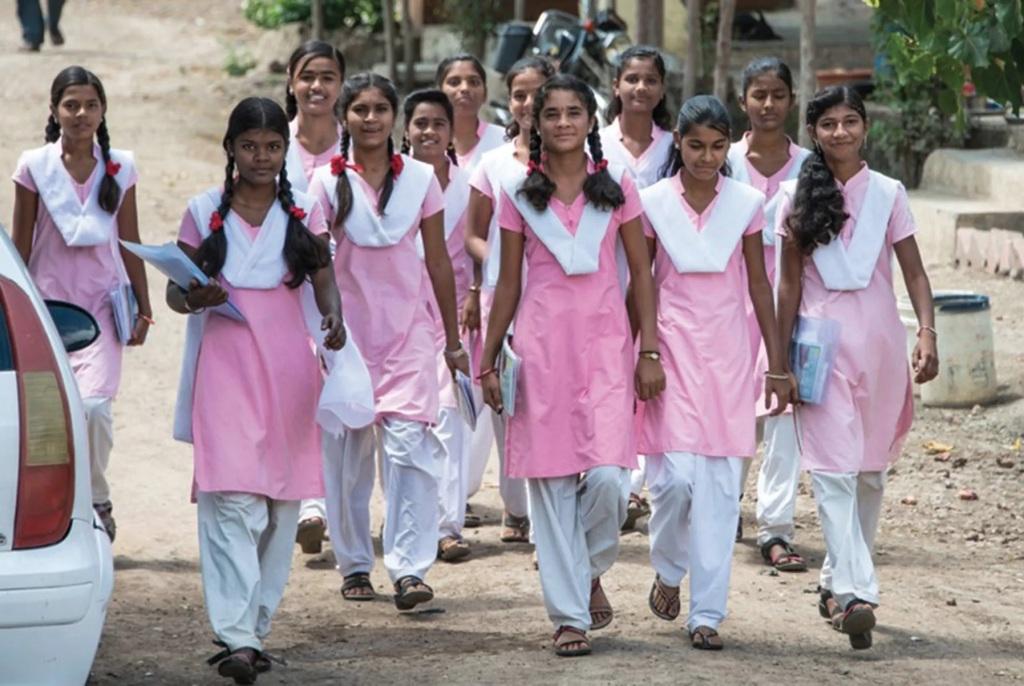


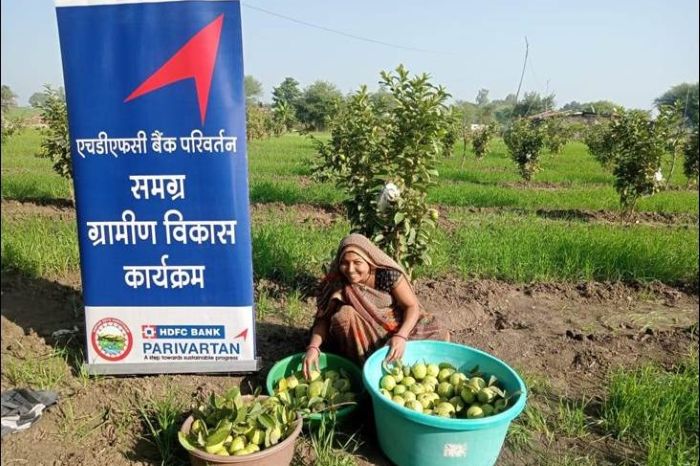
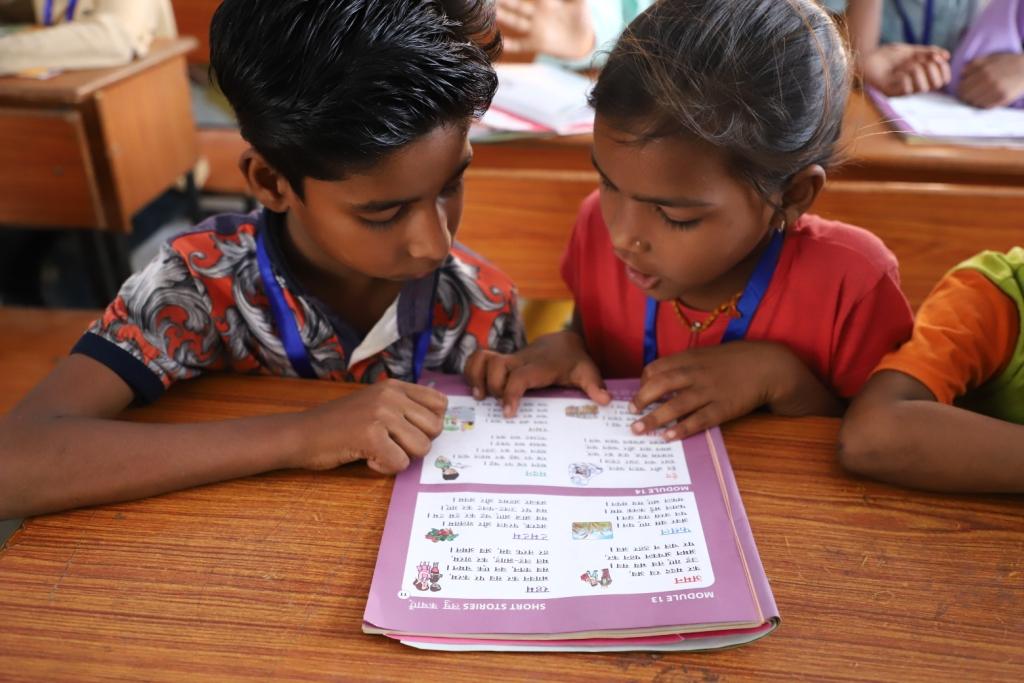
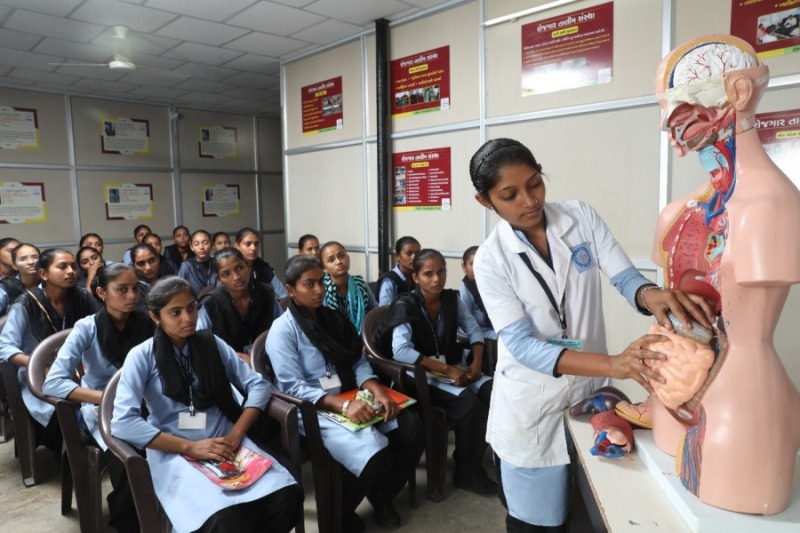

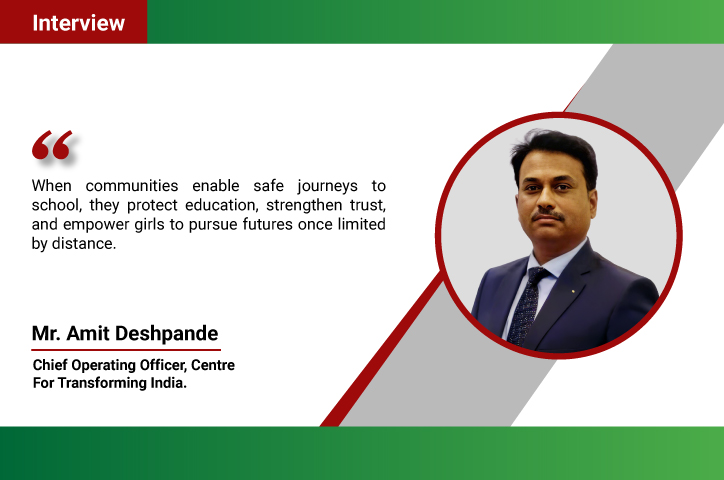






.jpg)



